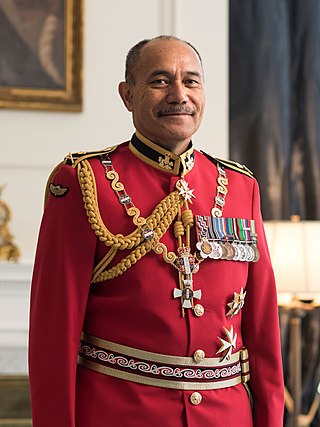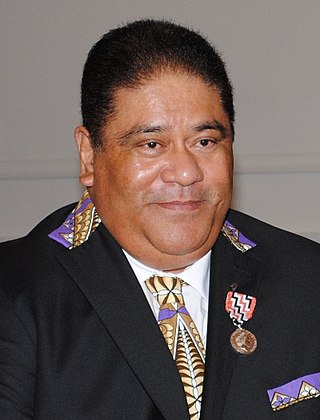
Whanganui, also spelled Wanganui, is a city in the Manawatū-Whanganui region of New Zealand. The city is located on the west coast of the North Island at the mouth of the Whanganui River, New Zealand's longest navigable waterway. Whanganui is the 19th most-populous urban area in New Zealand and the second-most-populous in Manawatū-Whanganui, with a population of 42,600 as of June 2022.
The disability rights movement is a global social movement that seeks to secure equal opportunities and equal rights for all people with disabilities.

Lieutenant General Sir Jeremiah Mateparae is a former New Zealand soldier who served as the 20th Governor-General of New Zealand between 2011 and 2016, the second Māori person to hold the office, after Sir Paul Reeves. A former officer in the New Zealand Army, he was Chief of the New Zealand Defence Force from 2006 to 2011, and then served as the director of the New Zealand Government Communications Security Bureau for five months in 2011. Following his term as governor-general, Mateparae was the High Commissioner of New Zealand to the United Kingdom between 2017 and 2020.
The term self-advocacy, which means speaking up for oneself and one's interests, is used as a name for civil rights movements and mutual aid networks for people with intellectual and developmental disabilities. The term arose in the broader civil rights movements of the 1960s and 1970s, and is part of the disability rights movement. Today there are self-advocacy organizations across the world.
IHC New Zealand is a New Zealand organisation providing support and care for people of all ages with intellectual disabilities. It began as the Society for Intellectually Handicapped Children, hence the IHC acronym. IHC advocates for the rights, inclusion and welfare of all people with an intellectual disability and supports them to live satisfying lives in the community. There are 13,000 young families who struggle with the pressures of raising a child with an intellectual disability, and 29,000 adults with an intellectual disability across New Zealand. IHC is New Zealand's largest provider of services to people with intellectual disabilities and their families, supporting more than 6000 people. Its history reaches back over 60 years to a group of families who set up an association to lobby for a better deal for their children.

John Baldwin Munro, better known as J. B. Munro, was a New Zealand politician of the Labour Party. He was also a notable disability advocate.

The Convention on the Rights of Persons with Disabilities is an international human rights treaty of the United Nations intended to protect the rights and dignity of persons with disabilities. Parties to the convention are required to promote, protect, and ensure the full enjoyment of human rights by persons with disabilities and ensure that persons with disabilities enjoy full equality under the law. The Convention serves as a major catalyst in the global disability rights movement enabling a shift from viewing persons with disabilities as objects of charity, medical treatment and social protection towards viewing them as full and equal members of society, with human rights. The convention was the first U.N. human rights treaty of the twenty-first century.

Paula Margaret Tesoriero is a former New Zealand paralympics racing cyclist and senior public servant.
The Family Movement, also known in the past as the Parent Movement, is an arm of the disability rights movement, a larger social movement. The Family Movement advocates for the economic and social rights of family members with a disability. Key elements include: social inclusion; active participation; a life of meaning; safety; economic security; accessibility and self-determination. The family movement has been critical in closing institutions and other segregated facilities; promoting inclusive education; reforming adult guardianship to the current supported decisionmaking; increasing access to health care; developing real jobs; fighting stereotypes and reducing discrimination.

Ari Daniel Ne'eman is an American disability rights activist and researcher who co-founded the Autistic Self Advocacy Network in 2006. On December 16, 2009, President Barack Obama announced that Ne'eman would be appointed to the National Council on Disability. After an anonymous hold was lifted, Ne'eman was unanimously confirmed by the United States Senate to serve on the Council on June 22, 2010. He chaired the council's Policy & Program Evaluation Committee making him the first autistic person to serve on the council. In 2015, Ne'eman left the National Council on Disability at the end of his second term. He currently serves as a consultant to the American Civil Liberties Union. As of 2019, he also is a Ph.D. candidate in Health Policy at Harvard University.
Gunnar Dybwad (1909–2001) was an American professor and advocate for the rights of people with disabilities, particularly developmental disabilities. He is best known for his support for the social model of disability, reframing disability accommodations as a matter of civil rights, not medical treatment. The American Association on Intellectual and Developmental Disabilities gives out the Dybwad Humanitarian Award annually in his honor.

Diane Kingston, is a human rights defender and international development specialist. She is the Global Technical Lead for Disability Inclusion and Mainstreaming at Sightsavers
Disability rights are not specifically addressed by legislation in New Zealand. Instead, disability rights are addressed through human rights legislation. Human rights in New Zealand are protected by the New Zealand Bill of Rights Act 1990 and the Human Rights Act 1993. New Zealand also signed and ratified the United Nations Convention on the Rights of Persons with Disabilities (CRPD) in 2008.

Michael Dennis Bush is a retired New Zealand police officer. He served as the New Zealand Commissioner of Police from April 2014 until April 2020.
The 2020 New Year Honours in New Zealand were appointments by Elizabeth II in her right as Queen of New Zealand, on the advice of the New Zealand government, to various orders and honours to reward and highlight good works by New Zealanders, and to celebrate the passing of 2019 and the beginning of 2020. They were announced on 31 December 2019.
Maria Verónica Reina was an Argentine educational psychologist and activist who campaigned internationally for disability rights. Representing the International Disability and Development Consortium, she was a leading contributor to negotiations on the United Nations Convention on the Rights of Persons with Disabilities.
Samuel Tanner is a New Zealand middle- and long-distance runner specialising in the 1500 metres. He is Māori; his iwi affiliation is Ngāpuhi. Tanner is the New Zealand indoor record holder for the 1500 metres.

Andrew John Becroft is a New Zealand Jurist and Barrister. From 2016 until 2021 Becroft was Children's Commissioner. Prior to that, he practised community law, and was a District Court judge and principal judge of the Youth Court of New Zealand. Throughout his career Becroft has taken a specialist approach to dealing with youth and child offenders and been involved in many organisations and initiatives to support this. During his time as Children's Commissioner, Becroft developed strong public positions of monitoring and advocacy on a range of issues related to the safety of children.

Fonotī Pati Peni Umaga is a New Zealand musician known for his compositions and musicianship as a bass guitar player, and significant contributions to the music industry, as well as his advocacy for the Pacific and Disabled communities. He works in the disability services sector.










